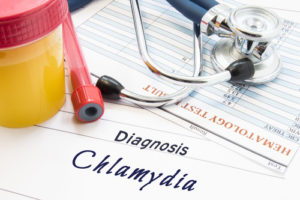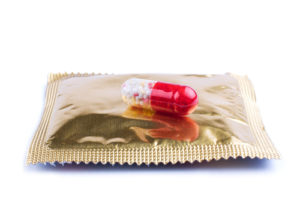Back to Main Page
What is it?
Chlamydia is a sexually transmitted infection that is caused by a bacteria called Chlamydia Trachomatis. Chlamydia is one of the most common S.T.I’s among young people with the number increasing every year. In 2014 in Ireland, 6695 Chlamydia cases were diagnosed in 20-25 year old age group making up 75% of the chlamydia cases diagnosed.
Chlamydia is a “silent” disease as a lot of individuals will not get any symptoms of the disease and therefore they will not know that they have it.
When left untreated, it can cause serious health implications including infertility (HIV Ireland). It can also cause premature labour and low birth weight in new born babies of an infected mother (HSE, 2016).
How is it passed on?
- Having unprotected vaginal, anal or oral sex
- Intimate contact with genitals
- Unprotected rimming (mouth to anus)
- Pregnant mother to baby
Symptoms
Approximately 70-80% of females and 50% of men will not have any symptoms of chlamydia.
Women – Symptoms may not appear until 1-3 weeks after coming into contact with chlamydia. Some women may notice;
- Abnormal discharge coming from vagina
- Stinging/burning sensation while urinating
- Having heavy periods or bleeding between periods
- Pain after sex or bleeding after sex
- Lower abdominal pain
Men – Symptoms are more common in men than in women. Again, symptoms may not appear until 1-3 weeks after coming into contact with the disease. Only 50% of men will have symptoms, these may include:
- White, Cloudy and/or watery discharge from the tip of the penis
- Pain while urinating
- Testicles swelling/pain in the testicles
Some of the symptoms may stop, however that does not mean the disease is gone. If left untreated, the disease can spread to the rest of the body infecting the mouth, throat, eyes urethra and/or rectum.
Diagnosis
Women
In females, all that needs to be taken is a small swab from the cervix (neck of womb) or vagina which can be taken by the nurse or the individual themselves.
Men
You may be asked to provide a urine sample. It is important that you do not pass urine for 1-2 hours beforehand.
Treatment & Prevention
The treatment for Chlamydia is antibiotics- for you and your partner. Please note that these antibiotic’s  can interfere with some contraceptive methods so talk to the Student Health Nurse for advice on this. You and your partner should abstain for sexual intercourse(including oral sex) until both of you have finished your antibiotics (and waited 7 days).
can interfere with some contraceptive methods so talk to the Student Health Nurse for advice on this. You and your partner should abstain for sexual intercourse(including oral sex) until both of you have finished your antibiotics (and waited 7 days).
Remember to prevent re-infection always use a condom and ensure it is applied consistently and correctly before sex (HSE,2016).
For more information on chlamydia, click on any of the following links;